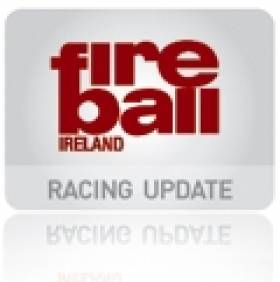Displaying items by tag: Matt Burge
Two-Step Introduction to the Irish Fireball Summer Season
#fireball – Normally the start of the Irish Fireball summer season is heralded with a coaching session by a leading UK Fireballer doing the honours. For a few years this weekend session was undertaken by Adam Bowers of ABC for Winning. Last year, Adam was succeeded by Simon Potts who with Tom Gillard won the 2013 Fireball Worlds in Portoroz in Slovenia (15091). Simon's circumstances have changed so this year the training will be undertaken by Richard Wagstaff who is also a former World and European Championship winning crew.
In tandem with Matt Burge, Richard won the World Championships hosted by Sligo Yacht Club in 2011 (15036) and won the Europeans the following years in Bracciano in Italy (15084), and Portoroz, Slovenia, again with Matt (15093).
The weekend of coaching takes place this weekend at the Dun Laoghaire Motor Yacht Club with a 09:00 start on the Saturday morning. Topics that are down for discussion include;
• Boat review & set up (in the dinghy park)
• Spinnaker hoist and acceleration on the top reach
• Straight line speed
• Crew tips and techniques
• At the start
• On the beat
• The hoist/gybe/drop
• Boat preparation – control lines set-up, rigging
• Regatta preparation, research.
Rigging and introductions will start off the proceedings on Saturday morning. Supper is proposed for the Purty Kitchen after the day's teaching is concluded. Sunday has a 09:30 start and it is expected that the Porsche Cup will be contested again.
The funding of the weekend avails of a scheme promoted by the Irish sailing Association and the Irish Fireball Class would like to acknowledge the support of the ISA in allowing us to offer this weekend of coaching to our members.
A recent class rule change however, prompted an earlier triggering of thoughts of summer racing. A reduction in the all up weight of the Fireball (hull, permanent fittings and weight correctors) from 79.4 to 76.4kg led to a very well organised weighing session that took place last Saturday, 18th April.
Approximately, fourteen Fireballs underwent a reweighing of either of two varieties – a full re-weighing in accordance with Class rules or a weighing of the correctors in individual boats. The Class rules require the boats to undergo a period of drying before the weighing takes place and Stephen Oram was able to organise premises for this purpose through work connections. Stephen also organised for appropriate scales to be available on the day. Irish Class Measurers, Eddie Ferris and Owen Sinnott documented the process which was a specific requirement of the rule change implantation and individual boat certificates of measurement were adjusted accordingly.
The statistics made for interesting discussion with some of the older boats putting relatively modest amounts of lead back into their boats. Most interestingly was the fact that one of the newest boats in the fleet was in actual fact carrying too much lead, so we can expect them to have an upturn in speed through the water. Despite a work schedule that embraced the prospect of weighing fourteen boats, a conveyor belt approach was taken to the weighing process and each boat was also checked for material left behind accidentally in the buoyancy tanks.
Class Chair, Marie Barry made sure that all those in attendance were properly looked after with sandwiches, biscuits, chocolate cake and tea/coffee available for all the participants.
Our thanks therefore go to Marie, Stephen, Eddie and Owen for giving of their time to the Class cause, and to Stephen for organising the premises and scales. The statistics of the day will be fed to Tom Egli, Technical Representative of Fireball International so that an assessment of the exercise worldwide can be undertaken.
A leaner Irish Fireball fleet is the favourable outcome of the day's proceedings!
With boats re-weighed last weekend and coaching this weekend, the advent of racing can be eagerly looked forward to and this gets underway with the first Tuesday night race next week, 28th April.





























































